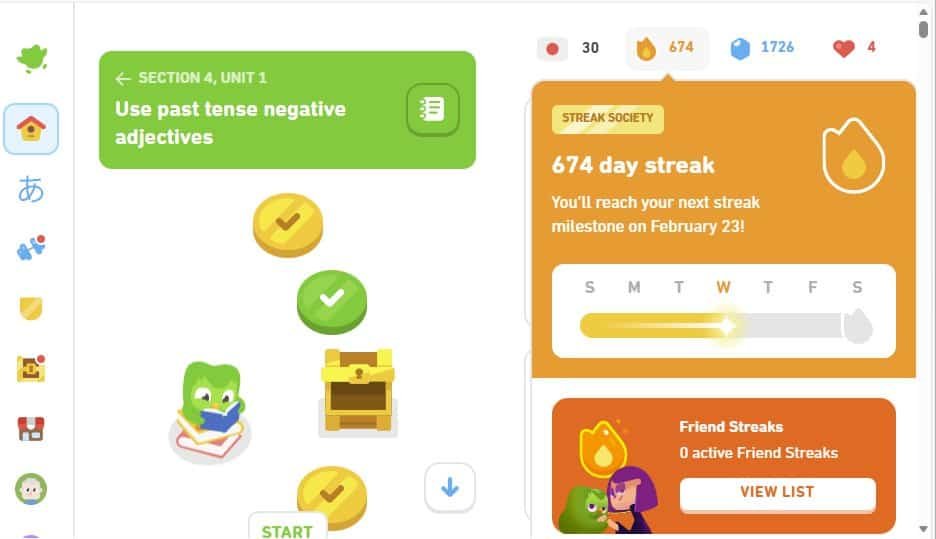Table of Contents
When You Need Something That Won’t Let You Down
Have you ever noticed that the smallest routines sometimes become the most important? Not the big resolutions or dramatic changes, but the quiet five-minute things that show up every single day, especially when everything else feels less stable.
For me, it’s been 674 days of stumbling through Japanese on Duolingo. For you, it might be something completely different. But the pattern is universal: when life gets messy, we reach for something simple and consistent that asks almost nothing but gives back more than it should.

Why We Need Anchors After Big Changes
After major life transitions, breakups, job changes, moves, or losses, we’re often left floating without a purpose. The routines we built with someone else or in another life don’t fit anymore. We need new ones, but everything feels overwhelming.
That’s when the smallest commitments become lifelines.
A daily walk. Duolingo lessons. Journaling three sentences before bed. Watering plants. Ten minutes of stretching. These aren’t impressive habits. They’re not going to transform your life overnight. But they prove something crucial: you can still show up for yourself when everything else has changed.
What makes you feel steady when life gets unpredictable?
The Power of Low-Stakes Consistency
Here’s what works about these small anchors: they don’t demand excellence. They just ask you to show up.
I’m not chasing fluency with my Japanese practice, I’m too old to be honest. I’m chasing consistency. Each morning I fumble through grammar, breathe a sigh of relief when something finally clicks, and move on. It’s quiet proof that I can still learn, still grow, still commit to something even when I don’t feel particularly motivated.
The app meets me wherever I am. Computer at home when I have time to focus. Phone between work tasks when I just need to maintain the streak. Some days feel productive, others feel like I’m just going through the motions. I might replay the same section for a month if I need to. But I’m showing up, and that’s what counts.
Have you ever discovered that consistency matters more than performance?
Why Simple Works (Especially When You’re Starting Over)
When you’re rebuilding after a major change, complexity is the enemy. You don’t need another thing demanding perfection. You need something manageable that won’t become another source of guilt when you’re already carrying too much.
That’s why tools like Duolingo work. Bite-sized lessons, no pressure to perform for anyone, just gentle progress at your own pace. It’s perfect for anyone dipping their toes into something new without the commitment of formal classes or expensive programs.
However, the specific tool doesn’t matter. What matters is finding something:
- Small enough that you can do it even on bad days
- Consistent enough that it creates rhythm in your life
- Forgiving enough that missing a day doesn’t mean failure
- Yours enough that it’s not about impressing anyone else
What could you commit to that feels manageable for you right now?
The Unexpected Gift
Here’s what I didn’t expect: this tiny habit would create connections. Students ask about my progress, we compare day streaks, suddenly we’re bonding over shared struggles with learning. There’s something genuinely touching about adults admitting they’re beginners at something.
Your anchor might do the same. The person who walks the same trail every morning starts recognizing other regulars. The journal writer joins online communities. The language learner discovers conversation partners.
Small routines don’t just anchor you, they connect you to others doing the same thing.
When Growth Doesn’t Need Drama
After 674 days, here’s what I’ve learned: growth doesn’t require intensity or excellence. It happens in quiet moments, in showing up when you don’t feel like it, in small victories nobody else notices.
You don’t need to overhaul your entire life. You need one manageable thing that proves you’re still moving forward, even when everything else feels stuck.
Maybe it’s learning a language for an upcoming trip. Maybe it’s practicing something alongside your kids to model that learning never stops. Maybe it’s finding five minutes each day for something that feeds your curiosity instead of your obligations.
The point isn’t what you choose. It’s choosing something and returning to it that builds you, even on the days when you don’t want to.
Your Anchor
What small routine has become more important than you thought it would? What five-minute commitment could you make that would give you something steady to hold onto?
It doesn’t need to be impressive. It just needs to be yours, and it needs to be daily.
What could become your anchor? Do you have any daily anchor ideas for others?






